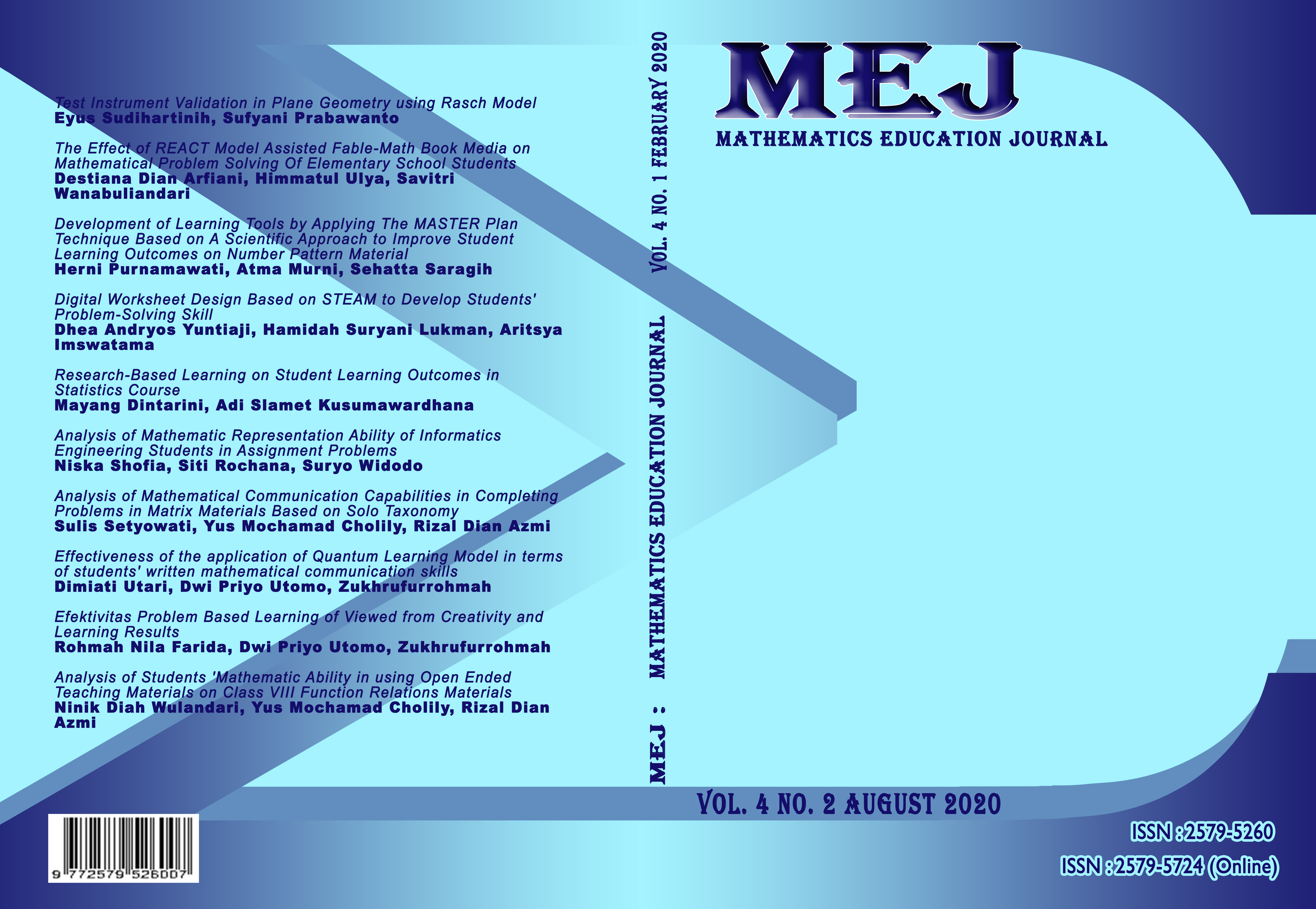The Effectiveness of Problem Based Learning in Terms of Creativity and Learning Outcomes
DOI:
https://doi.org/10.22219/mej.v4i2.12277Keywords:
Effectiveness, Problem Based Learning, Creativity, Learning OutcomesAbstract
This study aims to describe the effectiveness of Problem Based Learning in terms of student creativity and student learning outcomes. This research is located at Prigen Prosperous Middle School in the even / odd semester of the 2019/2020 school year. This type of research uses the type of descriptive research with descriptive qualitative research methods with research subjects VII grade students of Prosperous Prosperous Middle School. The steps in this research are determining the problem, conducting a literature study, determining the location, determining the method, data collection, and data analysis. In this study, the average percentage of the learning achievement in the preliminary activities was 92.21%, the core activities were 96.41% and the closing activities were 81.47% so that overall the learning implementation was categorized as very good. The average percentage of students' creativity is 82.0% with a very good category. The average percentage of student learning outcomes students 81.81% with a very good category. Based on the description, Problem Based Learning is effective in terms of students' creativity and learning outcomes.Downloads
References
Amalia, E., Surya, E., & Syahputra, E. (2017). The Effectiveness Of Using Problem Based Learning (Pbl) In Mathematics Problem Solving Ability For Junior High School Students. Ijariie-Issn(O)-2395-4396, 3(2), 3402–3406. Retrieved from www.ijariie.com Astriani, N., Surya, E., & Syahputra, E. (2017). the Effect of Problem Based Learning To Students ’ Mathematical the Effect of Problem Based Learning To Students ’ Mathematical Problem Solving. International Journal Of Advance Research And Innovative Ideas In Education, 3(February), 3441–3446. Cahyaningsih, U., & Ghufron, A. (2016). Pengaruh Penggunaan Model Problem-Based Learning Terhadap Karakter Kreatif Dan Berpikir Kritis Dalam Pembelajaran Matematika. Jurnal Pendidikan Karakter, (1), 104–115. https://doi.org/10.21831/jpk.v0i1.10736 Moleong, & Lexy. (2006). Metode Penelitian Pendidikan. Bandung: Remaja Rosadakarya. Munandar, & Utami. (2009). Pengembangkan Kreativitas Anak Berbakat. Jakarta: Padmavathy, R. D., & Mareesh, K. (2013). Effectiveness of Problem Based Learning In Mathematics. International Multidisciplinary E-Journal, II(I), 45–51. Retrieved from www.shreeprakashan.com Rizkia, S. A. (2017). the Influence of Ethnomathematics-Contained Problem Based Learning Model and Mathematical Disposition Skill Toward Mathematical Representation. Mathematics Education Journal, 1(2), 8. https://doi.org/10.22219/mej.v1i2.4624 Surya, E., Syahputra, E., Yuniza Eviyanti, C., & Simbolon, M. (2017). Improving the Students’ Mathematical Problem Solving Ability by Applying Problem Based Learning Model in VII Grade at SMPN 1 Banda Aceh Indonesia. International Journal of Novel Research in Education and Learning, 4(2), 138–144.Retrieved from https://www.researchgate.net/publication/318529138 Widayanti, L. (2013). Peningkatan Aktivitas Belajar Dan Hasil Belajar Siswa Dengan Metode Problem Based Learning Pada Siswa Kelas VIIA MTs Negeri Donomulyo Kulon Progo Tahun Pelajaran 2012/2013. Jurnal Fisika Indonesia UGM, 17(49), 32–35. https://doi.org/10.22146/jfi.24410 Wulandari, B., & Surjono, H. D. (2013). Pengaruh problem-based learning terhadap hasil belajar ditinjau dari motivasi belajar PLC di SMK. Jurnal Pendidikan Vokasi, 3(2), 178–191. https://doi.org/10.21831/jpv.v3i2.1600 Yustianingsih, R., Syarifuddin, H., & Yerizon, Y. (2017). Pengembangan Perangkat Pembelajaran Matematika Berbasis Problem Based Learning (PBL) untuk Meningkatkan Kemampuan Pemecahan Masalah Peserta Didik Kelas VIII. JNPM (Jurnal Nasional Pendidikan Matematika), 1(2), 258. https://doi.org/10.33603/jnpm.v1i2.563
Downloads
Published
Issue
Section
License
Authors who publish with MEJ (Mathematics Education Journal) agree to the following terms:
For all articles published in MEJ, copyright is retained by the authors. Authors give permission to the publisher to announce the work with conditions. When the manuscript is accepted for publication, the authors agree to automatic transfer of the publishing right to the publisher.
Authors retain copyright and grant the journal right of first publication with the work simultaneously licensed under a Creative Commons Attribution-ShareAlike 4.0 International License that allows others to share the work with an acknowledgment of the work's authorship and initial publication in this journal.
Authors are able to enter into separate, additional contractual arrangements for the non-exclusive distribution of the journal's published version of the work (e.g., post it to an institutional repository or publish it in a book), with an acknowledgment of its initial publication in this journal.
Authors are permitted and encouraged to post their work online (e.g., in institutional repositories or on their website) prior to and during the submission process, as it can lead to productive exchanges, as well as earlier and greater citation of published work (See The Effect of Open Access).

This work is licensed under a Creative Commons Attribution-ShareAlike 4.0 International License.










